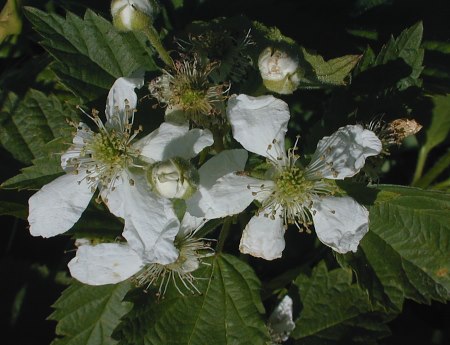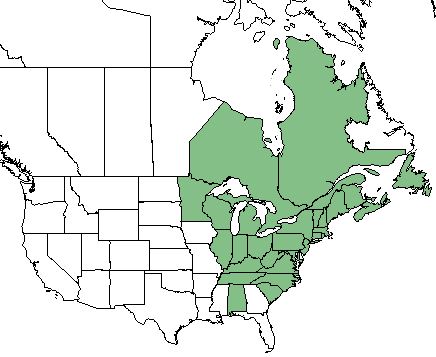Difference between revisions of "Rubus pensilvanicus"
(→Description) |
|||
| Line 25: | Line 25: | ||
==Description== | ==Description== | ||
<!-- Basic life history facts such as annual/perrenial, monoecious/dioecious, root morphology, seed type, etc. --> | <!-- Basic life history facts such as annual/perrenial, monoecious/dioecious, root morphology, seed type, etc. --> | ||
| − | ''R. pensilvanicus'' is a perennial subshrub of the ''Rosaceae'' family native to North America and Canada. <ref name= "USDA Plant Database"> USDA Plant Database [https://plants.usda.gov/core/profile?symbol=RUPE3 https://plants.usda.gov/core/profile?symbol=RUPE3] </ref> | + | ''R. pensilvanicus'' is a perennial subshrub of the ''Rosaceae'' family native to North America and Canada.<ref name= "USDA Plant Database"> USDA Plant Database [https://plants.usda.gov/core/profile?symbol=RUPE3 https://plants.usda.gov/core/profile?symbol=RUPE3] </ref> |
==Distribution== | ==Distribution== | ||
Revision as of 12:10, 22 April 2021
Common name: Pennsylvania blackberry [1], eastern blackberry [1]
| Rubus pensilvanicus | |
|---|---|

| |
| Photo by John Hilty hosted at IllinoisWildflowers.info | |
| Scientific classification | |
| Kingdom: | Plantae |
| Division: | Magnoliophyta - Flowering plants |
| Class: | Magnoliopsida - Dicots |
| Order: | Rosales |
| Family: | Rosaceae |
| Genus: | Rubus |
| Species: | R. pensilvanicus |
| Binomial name | |
| Rubus pensilvanicus Poir. | |

| |
| Natural range of Rubus pensilvanicus from USDA NRCS Plants Database. | |
Contents
Taxonomic Notes
Synonyms: R. argutus; R. andrewsianus Blanchard; R. barbarus L.H. Bailey; R. bellobatus L.H. Bailey; R. betulifolius Small; R. blakei L.H. Bailey; R. condensiflorus L.H. Bailey; R. congruus Bailey; R. cupressorum Fernald; R. defectionis Fernald; R. densissimus H.A. Davis & T. Davis; R. dissitiflorus Fernald; R. fatuus Bailey; R. floricomus Blanchard; R. floridus Trattinick; R. frondosus Bigelow; R. immanis L.H. Bailey; R. jennisonii L.H. Bailey; R. jugosus L.H. Bailey; R. laudatus Berger; R. leggii H.A. Davis & T. Davis; R. libratus L.H. Bailey; 'R. louisianus Berger; R. orarius Blanchard; R. ostryifolius Rydberg; R. pauxillus L.H. Bailey; R. pergratus Blanchard; R. philadelphicus Blanchard; R. praepes L.H. Bailey; R. prestonensis H.A. Davis & T. Davis; R. recurvans Blanchard; R. rosarius L.H. Bailey; R. subsolanus L.H. Bailey; R. tygartensis H.A. Davis & T. Davis
Varieties: none
Description
R. pensilvanicus is a perennial subshrub of the Rosaceae family native to North America and Canada.[2]
Distribution
R. pensilvanicus is found in the eastern half of the United States from Minnesota to Maine, as well as the Ontario, Quebec, New Brunswick, Nova Scotia, and Newfoundland/Labrador regions of Canada. [2]
Ecology
Habitat
R. pensilvanicus proliferates in roadsides, thickets, and woodlands. [1] Specimens have been collected from vacant lots, river floodplain, shallow waters, floodplain forests, planted slash pine plantation, open pasture, swampy woodland, thicket bordering marsh, bottomland woodland, edge of pine wood, bayside hammock, saw grass savanna, , and along small streams. [3]
Phenology
R. pensilvanicus has been observed to flower February through May. [4]
Conservation and Management
Cultivation and restoration
Photo Gallery
References and notes
- ↑ 1.0 1.1 1.2 Weakley, A. S. (2015). Flora of the Southern and Mid-Atlantic States. Chapel Hill, NC, University of North Carolina Herbarium.
- ↑ 2.0 2.1 USDA Plant Database https://plants.usda.gov/core/profile?symbol=RUPE3
- ↑ URL: http://herbarium.bio.fsu.edu. Last accessed: June 2018. Collectors: Sara J. Noyes, Loran Anderson, R.K. Godfrey, R. Kral, Sidney McDaniel, O. Lakela, D.B. Ward, L. B. Trott, Robert Lazor, K.M. Meyer, A. Townesmith, Lisa Keppner, Ed. Keppner, Kyle Shankle, William Platt. States and counties: Florida (Leon, Wakulla, Taylor, Liberty, Sumter, Jefferson, Gadsden, Polk, Levy, Gulf, Franklin, Bay, Holmes) Georgia (Thomas)
- ↑ Nelson, G. PanFlora: Plant data for the eastern United States with emphasis on the Southeastern Coastal Plains, Florida, and the Florida Panhandle. www.gilnelson.com/PanFlora/ Accessed: 29 MAY 2018